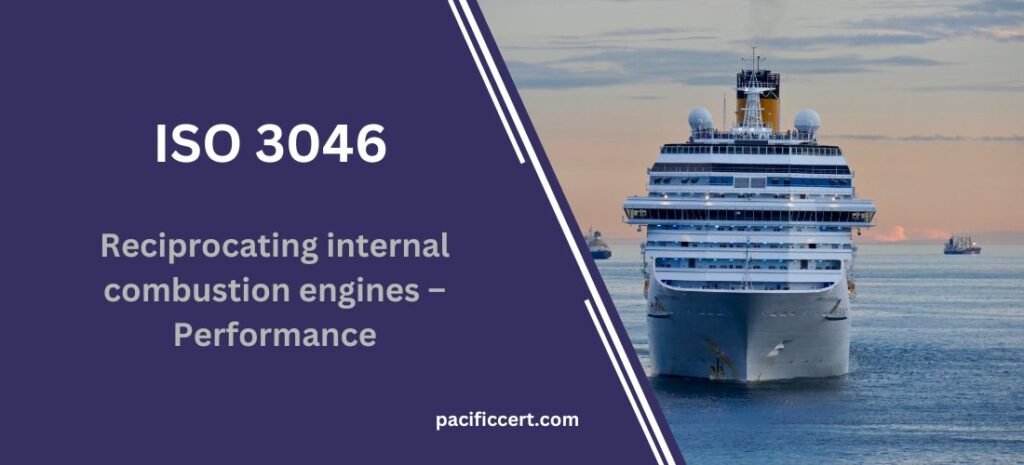
What is ISO 3046 Reciprocating Internal Combustion Engines – Performance?
ISO 3046 specifies the performance requirements for reciprocating internal combustion engines used in ships, locomotives, and other mobile applications. The standard provides a uniform basis for comparing the performance of engines manufactured by different companies.
ISO 3046 consists of three parts:
- Part 1: Declarations and basic requirements of engine power, speed and fuel consumption
- Part 2: Standard reference conditions and methods of correcting the observed power, speed and fuel consumption
- Part 3: Additional requirements for engines for use in marine propulsion and generating set applications
Part 1 specifies the basic requirements for engine power, speed, and fuel consumption, and defines the reference conditions for the measurements.
Part 2 provides the methods for correcting the observed engine power, speed, and fuel consumption to the reference conditions specified in Part 1.
Part 3 provides additional requirements for engines used in marine applications.
ISO 3046 is important because it provides a standardized way to measure and compare the performance of reciprocating internal combustion engines, which are widely used in various applications. The standard helps to ensure that engine manufacturers produce engines that meet the required performance specifications and helps end-users to select the right engine for their application.
What are the Requirements of ISO 3046
Engine Power: The standard specifies the engine power in kilowatts (kW) or horsepower (hp), measured at the crankshaft output. The power output is measured at the specified reference conditions and corrected to standard reference conditions specified in Part 2 of the standard.
Engine Speed: The engine speed is specified in revolutions per minute (RPM) and is measured at the crankshaft output.
Fuel Consumption: The fuel consumption is specified in grams per kilowatt-hour (g/kWh) or pounds per horsepower-hour (lb/hp-hr). The fuel consumption is measured at the specified reference conditions and corrected to standard reference conditions specified in Part 2 of the standard.
Reference Conditions: This standard specifies the reference conditions for measuring the engine power, speed, and fuel consumption. These include the temperature, pressure, and humidity of the ambient air, the fuel temperature, and the engine coolant temperature.
Test Procedures: The standard specifies the procedures for measuring the engine power, speed, and fuel consumption. Including the instruments and equipment to be used, the test cycle to be followed, and the corrections to be made to the measured values.
Additional Requirements for Marine Engines: Part 3 of the standard specifies additional requirements for engines used in marine applications. Including requirements for the engine cooling system, exhaust system, and emissions.
What are the Benefits of ISO 3046
Standardization: ISO 3046 provides a standardized way to measure and compare the performance of reciprocating internal combustion engines. This helps to ensure that engine manufacturers produce engines that meet the required performance specifications and helps end-users to select the right engine for their application.
Accuracy: The standard specifies the reference conditions for measuring the engine power, speed, and fuel consumption, and the procedures for making corrections to the measured values. This ensures that the performance measurements are accurate and reliable.
Efficiency: By providing accurate and reliable performance measurements, ISO 3046 helps to optimize the efficiency of reciprocating internal combustion engines. This can lead to lower fuel consumption, reduced emissions, and improved overall performance.
Safety: The standard includes additional requirements for engines used in marine applications. Such as requirements for the engine cooling system, exhaust system, and emissions. These requirements help to ensure that the engines are safe to use and do not pose a risk to people or the environment.
Compatibility: ISO 3046 helps to ensure that engines manufactured by different companies are compatible with each other, which is important for applications where multiple engines may be used together. Such as in a ship or locomotive.
Who Needs ISO 3046 Reciprocating Internal Combustion Engines – Performance?
Engine Manufacturers: Manufacturers of reciprocating internal combustion engines can use ISO 3046 as a guideline to design and manufacture engines that meet the required performance specifications. The standard helps manufacturers to ensure that their engines are reliable, efficient, safe, and compatible with other engines.
Shipbuilders: Shipbuilders can use ISO 3046 to select the appropriate engines for their ships. Ensuring that they meet the required performance specifications. The standard helps shipbuilders to optimize the efficiency of the engines, and reduce emissions. Also, ensure that the engines are safe to use.
Ship Owners and Operators: Ship owners and operators can use this standard to select the appropriate engines for their ships and ensure that they are operating efficiently and safely. The standard helps them to optimize fuel consumption, reduce emissions, and improve overall performance.
Locomotive Manufacturers and Operators: Manufacturers and operators of locomotives can use ISO 3046 to ensure that their engines meet the required performance specifications and operate efficiently and safely.
Regulatory Bodies: Regulatory bodies can use this standard as a guideline to develop regulations and standards for the performance of reciprocating internal combustion engines used in ships, locomotives, and other mobile applications. So, The standard helps regulatory bodies to ensure that the engines are safe, reliable, and efficient.
It is useful for anyone involved in the design, manufacture, operation, or maintenance of reciprocating internal combustion engines used in mobile applications.
ISO 3046-1:2002
ISO 3046-1:2002 specifies the requirements for reciprocating internal combustion engines for land, rail, and marine use.
Specifically, ISO 3046-1:2002 provides guidelines for the measurement and evaluation of engine power and performance characteristics. Including power output, fuel consumption, and exhaust emissions. The standard also specifies the testing procedures and conditions that should be used to ensure accurate and consistent measurements.
ISO 3046-1 applies to engines that are used for propulsion, as well as for driving auxiliary equipment. Such as generators or pumps. It is intended to ensure that engine performance is measured and reported in a consistent and standardized manner. Allowing for fair comparisons between different engines and manufacturers.
ISO 3046-3:2006 Part 3: Test measurements
ISO 3046-3:2006 provides guidelines for conducting test measurements on reciprocating internal combustion engines for land, rail, and marine use.
The standard specifies the procedures and conditions for measuring engine power, fuel consumption, and exhaust emissions. Including the use of test equipment, instrumentation, and sampling techniques. It also includes guidelines for interpreting and reporting the test results.
ISO 3046-3:2006 is intended to ensure that engine performance is measured and reported in a consistent and standardized manner. Allowing for fair comparisons between different engines and manufacturers. It applies to engines that are used for propulsion, as well as for driving auxiliary equipment. Such as generators or pumps.
Some of the key topics covered in ISO 3046-3:2006 include the test procedure, measurement uncertainty, calibration of test equipment, measurement of engine power, measurement of fuel consumption, measurement of exhaust emissions, and calculation of test results. The standard also provides guidance on the selection of appropriate test cycles and the preparation of test reports.
ISO 3046-4:2009 Part 4: Speed governing
ISO 3046-4:2009 provides guidelines for the design, testing, and performance of speed governors for reciprocating internal combustion engines used in land, marine, and stationary applications.
The standard specifies the requirements for speed governors, which are devices that regulate the speed of an engine by controlling the fuel supply. Speed governors are an essential component of an engine’s control system, and they play a critical role in ensuring that the engine operates at a consistent speed under varying load conditions.
ISO 3046-4:2009 covers both mechanical and electronic speed governors and provides guidance on their design, testing, and performance. The standard includes requirements for the governor’s response time, stability, accuracy, and reliability. It also specifies the procedures for testing and evaluating the governor’s performance. Including the use of test equipment and the selection of appropriate test procedures.
In addition to the technical specifications, ISO 3046-4 includes recommendations for the installation, operation, and maintenance of speed governors. The standard is intended to ensure that speed governors are designed and operated in a manner that is safe, and reliable, Also, consistent with the engine’s performance requirements.
ISO 3046-5:2001 Part 5: Torsional vibrations
ISO 3046-5:2001 provides guidelines for the measurement, evaluation, and control of torsional vibrations in reciprocating internal combustion engines used in land, marine, and stationary applications.
Torsional vibrations are oscillations of the crankshaft that can occur when an engine is operated under certain conditions. Such as changes in load or speed.
These vibrations can lead to mechanical failures, such as fatigue or fracture of engine components. And can also cause operational problems. Such as increased noise and vibration.
ISO 3046-5 specifies the procedures and conditions for measuring and evaluating torsional vibrations in reciprocating internal combustion engines. Including the use of measurement equipment and instrumentation. The standard also includes guidelines for controlling torsional vibrations. Including the use of torsional vibration dampers and other design modifications.
ISO 3046-5:2001 is intended to ensure that torsional vibrations are identified and controlled in a manner that is safe, reliable, and consistent with the engine’s performance requirements. The standard applies to engines that are used for propulsion. As well as for driving auxiliary equipment such as generators or pumps.
It is important to note that compliance with this standard does not guarantee complete elimination of torsional vibrations, but rather aims to minimize their impact on engine performance and safety.
ISO 3046-6:2020 Part 6: Overspeed protection
ISO 3046-6:2020 provides guidelines for the design, testing, and performance of overspeed protection systems for reciprocating internal combustion engines used in land, marine, and stationary applications.
The standard specifies the requirements for overspeed protection systems, which are designed to prevent the engine from exceeding its maximum safe operating speed. Overspeed can lead to mechanical failures. Such as fatigue or fracture of engine components. And can also cause operational problems, such as increased noise and vibration.
ISO 3046-6:2020 covers both mechanical and electronic overspeed protection systems and provides guidance on their design, testing, and performance. The standard includes requirements for the response time, accuracy, and reliability of the overspeed protection system. It also specifies the procedures for testing and evaluating the system’s performance. Including the use of test equipment and the selection of appropriate test procedures.
In addition to the technical specifications, ISO 3046-6 includes recommendations for the installation, operation, and maintenance of overspeed protection systems. The standard is intended to ensure that overspeed protection systems are designed and operated in a manner that is safe and reliable. Also, consistent with the engine’s performance requirements.
Pacific Certifications is accredited by ABIS, if you need more support with ISO 3046, please contact us at +91-8595603096 or support@pacificcert.com
Read About: ISO 3006:2015







